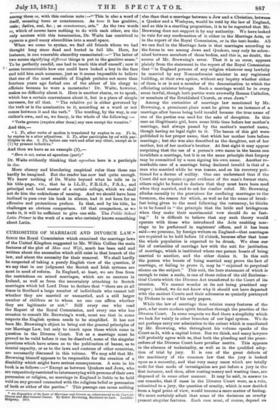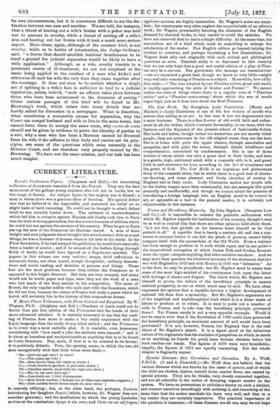CURIOSITIES OF MARRIAGE AND DIVORCE LAW.* SINCE the Royal Commission
which examined the marriage laws of the United Kingdom suggested to Mr. Wilkie Collins the main features of the plot of Man and Wife, much has been said and written about the anomalies which still exist in that branch of the law, and about the necessity for their removal. We shall hardly be suspected of taking a purely English view of the question, if we say that in our judgment the Scotch and Irish systems are most in need of reform. In England, at least, we are free from the restrictions on mixed marriages, which are so onerous in Ireland, as well as from the uncertainty attaching to Scotch marriages which led Lord Deas to declare that "there are at all times in Scotland a large number of individuals who cannot tell whether they are married or unmarried, and a still larger number of children as to whom no one can affirm whether they are legitimate or not." Still every one who read the Report of the Royal Commission, and every one who has occasion to consult Mr. Browning's work, must see that in some respects the English system needs to be simplified. It has not been Mr. Browning's object to bring out the general principles of our Marriage Law, but only to touch upon those which come in question in the Divorce Court. Yet as a marriage must be proved to be valid before it can be dissolved, some of the singular questions which have arisen as to the publication of banns, as to mental capacity, or as to the laws and customs of other countries, are necessarily discussed in this volume. We may add that Mr. Browning himself appears to be responsible for the creation of a disability which might have serious consequences. A note in his book is as follows :—" Except as between Quakers and Jews, who are respectively restricted to intermarrying with persons of their own persuasion or religion, no marriage in England is liable to be held void on any ground connected with the religious belief or persuasion of both or either of the parties." This passage can mean nothing • Art Exposition of the Laws of Marriage and Divorce as Administered Os Me Court for Divonce and Matrimonial Caused. By Ernst Browning, Barrister-at-Law. London: Ridgway. 1872.
else than that a marriage betweeu a Jew and a Christian, between a Quaker and a Wesleyan, would be void by the law of England, and as this is a startling proposition, it is to be regretted that Mr.
Browning does not support it by any authority. We have looked in vain for any confirmation of it either in the Marriage Acts, or in the report of the Royal Commission, or in the text-books. All we can find in the Marriage Acts is that marriages according to- the forms in use among Jews and Quakers, may only be solem- nised between members of those bodies, and this is, no doubt, the- source of Mr. Browning's error. That it is an error, appears plainly from the statement in the report of the Royal Commission that "in England persons of any religion whatever may lawfully be married by any Nonconformist minister in any registered building, at their own option, without any inquiry whether either of them is or is not a member of the denomination to which the' officiating minister belongs. Such a marriage would be in every sense lawful, though both parties were avowedly Roman Catholics, or members of the Established Church, or even Jews."
Among the curiosities of marriage law mentioned by Mr. Browning, a prominent place must be given to an instance of a marriage after banns being held invalid because the true name of one of the parties was used for the sake of deception. In thin case an illegitimate girl, born some little time before her mother's marriage, had always passed by the mother's married name, though having no legal right to it. The banns of this girl were- published in her proper name, that which her mother bore before- marriage ; but she was also described as the daughter, not of her mother, but of her mother's brother. At first sight it may appear- surprising that the use of a person's own name in the banns can invalidate a marriage, but it is on the same principle that forgery may be committed by a man signing his own name. Another re- markable case of a marriage being declared invalid is that of a. man who married while he was insane, and on his recovery peti- tioned for a decree of nullity. One can understand that if the- Court did not require cegent evidence of the man's former state, others might be found to declare that they must have been mad when they married, and to ask for similar relief. Mr. Browning alludes casually to the provisions for confining marriages to the forenoon, the reason for which, as well as for the name of break- fast being given to the meal following the ceremony, he thinks. is to be found in "the principle that the bride and bridegroom when they make their matrimonial vow should do so fast- ing." It is difficult to believe that any such theory would operate with those who introduced the Acts enabling mar- riage to be performed in registrars' offices, and it has been said—we presume, by foreign writers on England—that marriages. are required to be held before 12 o'clock, because after that hour- the whole population is expected to be drunk. We close our- list of curiosities of marriage law with the suit for jactitation of marriage, which is instituted where one person boasts of being married to another, and the other denies it. In this suit. the person who boasts of being married may prove the fact of marriage, or failing to prove it, may be "enjoined to perpetual, silence on the subject." This suit, the bare statement of which is. enough to raise a smile, is one of those relics of the old Ecclesias- tical Courts which the Divorce Act transferred to the Court of its. creation. We cannot wonder at its not being practised any longer ; indeed, we do not know why it should not have departed with the ancient Courts and their advocates so quaintly portrayed by Dickens in one of his early papers.
While the law of marriage thus retains many features of the. past, a far more modern spirit breathes through the practice of the- Divorce Court. In some respects we find there a simplicity which we look for vainly in other branches of our legal system. We do. not perhaps carry our admiration to the extent which is manifested by Mr. Browning, who throughout his volume speaks of the- Court as It, with a capital letter. But we think, and many lawyereg will probably agree with us, that both the pleading and the proce- cedure of the Divorce Court have peculiar merits. This appears in the absence of technicality, as well as in the qualified adop- tion of trial by jury. It is one of the great defects of the machinery of the common law that the jury is looked upon as a necessity, and that very many cases which are totally unfit for that mode of investigation are put before a jury in the, first instance, and then, after costing money and wasting time, are, disposed of in some other manner. It may be said, in answer to. our remarks, that if cases in the Divorce Court were, as a rule, submitted to a jury, the question of cruelty, which is now decided from a legal point of view, would become a mere matter of feeling. We must certainly admit that some of the decisions on cruelty present singular features. Each case must, of course, depend on its own circumstances, but it is sometimes difficult to see the dis- tinction between one case and another. We are told, for instance, that a threat of beating out a wife's brains with a poker was held not to amount to cruelty, while a threat of cutting off a wife's arm and beating out her brains with it took a much more serious aspect. Mere abuse, again, although of the coarsest kind, is not cruelty, while as to habits of intoxication, the Judge Ordinary said, "a decree that should establish habitual drunkenness to be itself a ground for judicial separation would be likely to have a wide application." Although, as a rule, cruelty consists in a persistent course of ill-treatment, we are not surprised at the name being applied to the conduct of a man who kicke I and otherwise ill-used his wife the only time they came together after the marriage. It does not seem to be certain whether a single act of spitting in a wife's face is sufficient to lead to a judicial separation, unless, indeed, "such an offence takes place between those who have been accustomed to the decencies of society." Other curious passages of this kind will be found in Mr. Browning's work, which enters into many details that are hardly suited for discussion in a newspaper. What is desertion, what constitutes a reasonable excuse for separation, why the Court can compel husband and wife to live in the same house, but cannot force them to occupy the same room, why cartes-de-visite should not be given in evidence to prove the identity of parties to a suit, why a man who has been a Mormon cannot be divorced from his wife if she adheres to that body and carries out its prin- ciples, are some of the questions which arise naturally in the Divorce Court, and are therefore very properly treated by Mr. Browning. We have not the same mission, and our task has been much simpler.



































 Previous page
Previous page